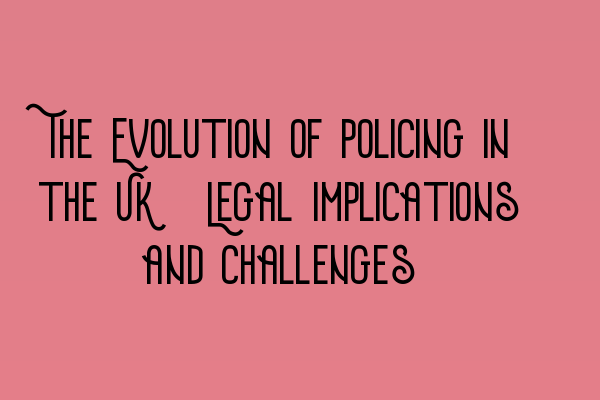The Evolution of Policing in the UK: Legal Implications and Challenges
Law enforcement has undergone significant changes over the years, reflecting the evolving needs of society and advancements in technology. The United Kingdom, in particular, has witnessed a fascinating journey in the development of its policing system. In this article, we will explore the various stages of the evolution of policing in the UK, while also addressing the legal implications and challenges associated with these changes.
1. The Origins of Policing in the UK
The roots of modern policing in the UK can be traced back to the 19th century. During this time, the concept of a professional police force began to emerge as an alternative to the relatively informal system of constables, watchmen, and volunteers that existed before. Most notable among these early developments was the establishment of the Metropolitan Police in London in 1829, which set the template for future policing practices.
For more information about the history of policing in the UK, you can visit our article on the history of policing in the UK.
2. The Police and Criminal Evidence Act 1984 (PACE)
One of the most significant milestones in the evolution of UK policing was the enactment of the Police and Criminal Evidence Act 1984 (PACE). This legislation established a comprehensive framework for police powers, procedures, and safeguards, ensuring that law enforcement agencies operated within the boundaries of the law.
For a detailed analysis of the key provisions and implications of PACE, you can read our article on the Police and Criminal Evidence Act 1984.
3. Technology and Modern Policing
The 21st century has witnessed an unprecedented influx of technology, revolutionizing every aspect of our lives, including policing. Law enforcement agencies now utilize sophisticated tools and techniques to combat crime, enhance public safety, and gather evidence. From CCTV cameras and facial recognition software to DNA profiling and digital forensics, technology has significantly transformed policing practices in the UK.
Our article on technology in modern policing explores the benefits and challenges associated with these advancements in detail.
4. Public Perception and Accountability
As the policing landscape evolves, public perception and accountability play an increasingly crucial role. Maintaining trust and confidence in the police is vital for effective law enforcement. Consequently, recent years have seen a greater emphasis on transparency, diversity, and community engagement within the police forces in the UK.
To delve deeper into the topic of public perception and accountability in policing, visit our article on public perception and accountability in UK policing.
5. Challenges Faced by Modern Policing
Despite the progress made in the evolution of policing, there are formidable challenges that law enforcement agencies continue to face. Cybercrime, terrorism, and the rise of organized crime present complex problems for the police. Additionally, issues such as budget constraints, changing patterns of criminal activity, and the increasing complexity of legislation further compound these challenges.
Our article on challenges faced by modern policing provides an in-depth examination of these hurdles and proposes potential solutions.
Conclusion
The evolution of policing in the UK has been a dynamic process, shaped by societal changes, legislative developments, and technological advancements. While significant progress has been made, there are always new challenges on the horizon that need to be addressed. By understanding the history, legal implications, and the challenges faced by modern policing, we can work towards fostering a safer and more secure society.
For more information on legal topics and preparation for the SQE exams, feel free to explore our related articles:
